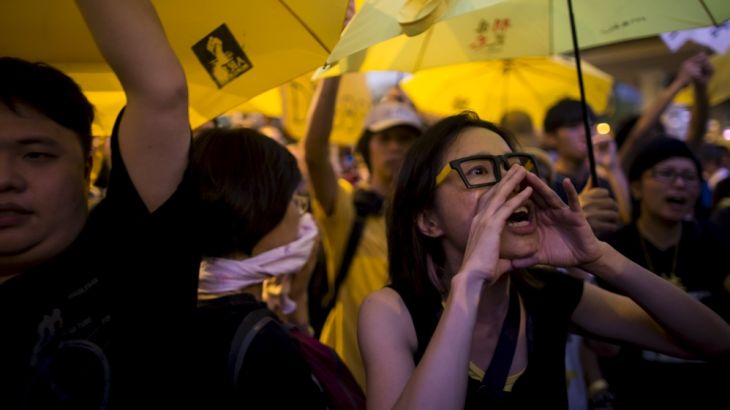Rallies in Hong Kong mark anniversary of mass protests
Frustrated activists now say they need to regroup and come up with new strategies to confront Beijing.

Thousands of pro-democracy activists rallied near government headquarters in Hong Kong amid tight security to mark the first anniversary of pro-democracy protests that crippled parts of the Chinese-controlled city.
Yellow umbrellas and makeshift tents were back in the city centre on Monday, as the protesters gathered chanting anti-government slogans, according to Al Jazeera’s Rob McBride.
He said that some of the “more radical” activists have been urging protesters to go out to the road and block traffic.
Q&A: The Hong Kong teenager who confronted China
A large contingent of police have been deployed by the city to secure the protest area while several thousand more are on standby, McBride said.
Police were on alert to avoid a repeat of last year when protesters streamed onto major highways in a push for full democracy demonstrations that became the biggest political challenge to Beijing’s Communist Party leaders in decades.
Metal barriers were stockpiled in key locations, including government headquarters and near the office of Hong Kong leader Leung Chun-ying.
Universal suffrage
At the height of the 2014 protests, which lasted for more than two months, tens of thousands regularly gathered to demand political reform.
Yet, despite the unprecedented rallies that garnered extensive coverage across the world, protesters were unable to force change.
|
|
Frustrated activists now say they need to regroup and come up with new strategies, conceding that changing the minds of Beijing and the Hong Kong government is currently a hopeless task.
Protest leaders on Monday encouraged the crowd to fight on.
“The authorities will still be against us, but that doesn’t mean we will give up,” said student leader Lester Shum.
Occupy Central co-founder Benny Tai called 2014 “one of the most important years in Hong Kong history”.
“The Umbrella Movement … was just the beginning for Hongkongers in their quest for democracy,” he said.
Some protesters expressed their anger at the lack of progress.
“We have not achieved universal suffrage,” a woman in her 30s, who gave her name as Lam, told AFP.
“Society is not geared to helping Hongkongers.”
Lam had brought her young son to the gathering.

“He knows that what we are doing is to avoid a fake election,” she said.
Occupy Central was launched exactly a year ago, calling for fully free leadership elections in the semi-autonomous city, following more than a week of student protests.
The protests began after China’s central government said it would allow a popular vote for Hong Kong’s leader in 2017, but insisted candidates would be vetted.
The electoral package was voted down in June by pro-democracy lawmakers unhappy with the restrictions, leaving the territory with its existing system where the leader is chosen by a pro-Beijing election committee.
Hong Kong has been governed under a “one country, two systems” arrangement since it was handed back to China by Britain in 1997.